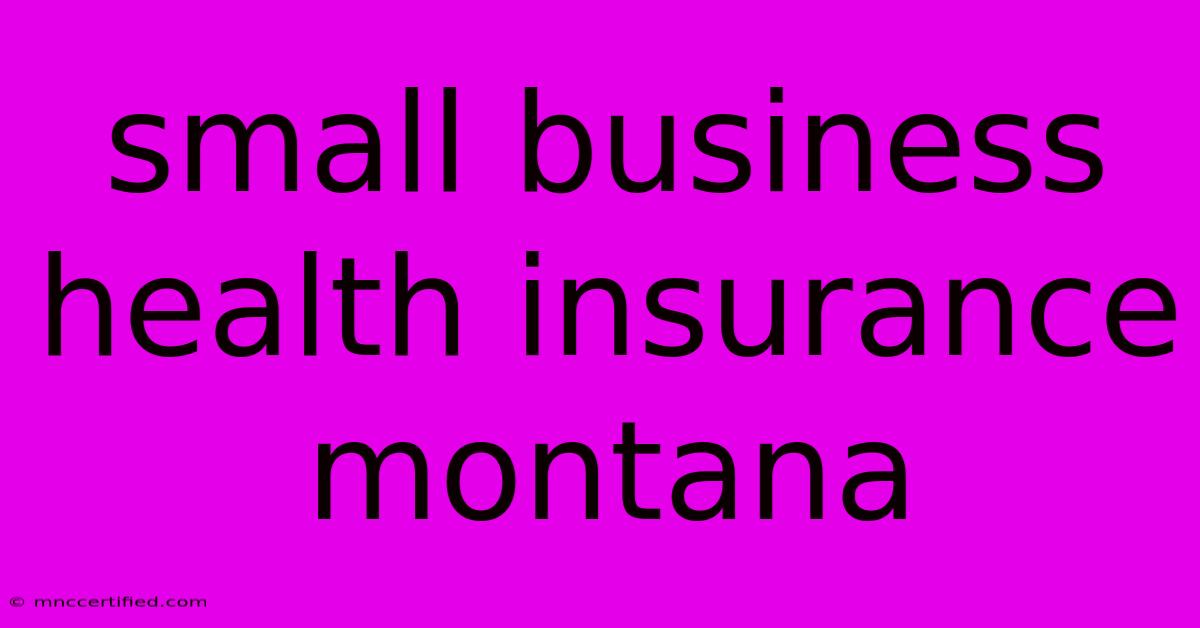Small Business Health Insurance Montana

Table of Contents
Navigating Small Business Health Insurance in Montana: A Comprehensive Guide
Running a small business in Montana comes with its own set of challenges, and ensuring your employees' health and well-being is a top priority. Choosing the right small business health insurance plan can be overwhelming, but it's essential for attracting and retaining talent. This comprehensive guide will walk you through the intricacies of Montana's health insurance landscape, providing valuable insights and resources to make informed decisions for your business.
Understanding Montana's Health Insurance Market
Montana's health insurance market is diverse, offering a range of plans to suit different needs and budgets. While some similarities exist with the national market, there are specific nuances to consider.
Key Considerations for Montana Small Businesses:
- State-Specific Regulations: Montana has its own regulations regarding health insurance, including the Montana Health Insurance Marketplace (also known as Montana Health Connect). This platform facilitates plan comparisons and enrollment for individuals and small businesses.
- Rural Coverage: Montana's vast geography and rural communities present unique challenges in accessing healthcare. Consider providers' network coverage and availability when choosing a plan.
- Small Business Tax Credits: Montana offers tax credits to small businesses that offer health insurance to their employees. This can significantly offset your costs.
- Employer Mandates: Montana requires employers with 50 or more full-time equivalent employees to offer health insurance. Understanding these mandates is crucial for compliance.
Types of Small Business Health Insurance Plans in Montana
Several health insurance plan options are available to small businesses in Montana. Understanding the differences will help you choose the right plan for your company:
1. Individual Health Insurance:
- Pros: Flexible, customizable plans for self-employed individuals or small businesses with few employees.
- Cons: Limited network options, higher premiums compared to group plans.
2. Group Health Insurance:
- Pros: Lower premiums than individual plans, wider network coverage, tax advantages.
- Cons: Higher administrative costs, potential limitations on plan customization.
3. Small Business Health Options Program (SHOP)
- Pros: Access to a wider range of plans, potential tax credits, competitive pricing.
- Cons: Less flexibility than individual plans, enrollment deadlines to consider.
4. Association Health Plans (AHPs)
- Pros: Larger pools of members, potential for lower premiums.
- Cons: May require membership in a trade association, limited availability in Montana.
How to Choose the Right Small Business Health Insurance Plan in Montana
Selecting the right plan involves considering your business's specific needs, employee demographics, and budget. Here's a step-by-step guide:
1. Assess your needs: Determine the number of employees, budget constraints, and desired coverage levels.
2. Research available plans: Compare options from different insurance carriers, considering premiums, deductibles, co-pays, and network coverage.
3. Consider employee preferences: Gather feedback from your employees regarding their healthcare needs and preferences.
4. Utilize online resources: Montana Health Connect provides an online platform for comparing and enrolling in plans.
5. Consult with a broker: An insurance broker can provide personalized guidance and help you navigate the complex process.
6. Understand the fine print: Carefully review the plan documents to understand coverage details, exclusions, and limitations.
7. Review your plan annually: Evaluate your plan periodically to ensure it remains aligned with your business needs and current market offerings.
Conclusion: Ensuring Employee Health and Well-being in Montana
Choosing the right small business health insurance in Montana requires careful planning and consideration. By understanding the available options, consulting with experts, and continuously reviewing your plan, you can effectively navigate the health insurance landscape and provide valuable benefits for your employees. Remember, investing in your workforce's health is a crucial step towards a thriving and successful business in Montana.

Thank you for visiting our website wich cover about Small Business Health Insurance Montana. We hope the information provided has been useful to you. Feel free to contact us if you have any questions or need further assistance. See you next time and dont miss to bookmark.
Featured Posts
-
Whats Next For Shetland Jensens Update
Nov 08, 2024
-
Ps 5 Pro Review 7 Enhanced Games You Need
Nov 08, 2024
-
How Much Is Insurance For A Cadillac Cts
Nov 08, 2024
-
Fed Chair Powell Latest News
Nov 08, 2024
-
Inverse Finance Crypto Price Prediction
Nov 08, 2024